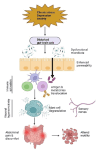A Mini Literature Review of Probiotics: Transforming Gastrointestinal Health Through Evidence-Based Insights
- PMID: 38681263
- PMCID: PMC11051678
- DOI: 10.7759/cureus.57055
A Mini Literature Review of Probiotics: Transforming Gastrointestinal Health Through Evidence-Based Insights
Abstract
As our understanding of the intricate interaction between gut bacteria and human health continues to expand, so too has interest in the ability of probiotics to manage gut microbiota and confer multiple health benefits to the host. The mini literature review focuses on the expanding potential of the use of probiotics in GI health, with a focus on probiotics' potential therapeutic advantages in a variety of gastrointestinal (GI) illnesses. Probiotics play a significant role in managing diarrhea and symptoms of irritable bowel syndrome with diarrhea (IBS-D) by modulating gut microbial communities. Specific probiotic strains have been found to reduce the abundance of harmful bacteria, regulate inflammatory markers like interleukin 6, and improve GI symptoms such as abdominal discomfort and stool consistency. Additionally, probiotic blends have shown potential for preventing GI infections and alleviating GI pain in IBS-D patients. Studies have demonstrated that certain multi-strain probiotics, including Bifidobacterium and Lactobacillus species, can significantly increase the frequency of bowel movements and reduce the proportion of individuals experiencing constipation. It has also been found that probiotic supplementation may reduce the incidence of postoperative complications and mortality, particularly in patients undergoing colorectal adenocarcinoma surgery. Additionally, probiotics have been associated with decreased levels of pro-inflammatory cytokines and improved clinical outcomes in patients with colorectal cancer. Furthermore, probiotics have been associated with enhanced digestive tolerance, reduced GI inflammation, and prolonged clinical remission in certain UC patients. Studies have also shown that probiotics, administered either directly to infants or pregnant women during the perinatal stage, can alleviate symptoms such as inconsolable crying and irritation associated with infant colic, improve bowel movement frequency in cases of functional constipation, and enhance overall conditions in premature infants, including reducing regurgitation and improving feeding tolerance. The review addresses both encouraging results and challenges with probiotic therapy, while also arguing for more studies to elucidate underlying mechanisms and enhance therapeutic techniques. As we traverse the complex field of probiotic therapy in the treatment of GI illnesses, researchers, physicians, and other healthcare professionals can benefit from the informative information provided by this study.
Keywords: colorectal cancer; constipation; diarrhea; dysbiosis; gastrointestinal diseases; gut microbiota; irritable bowel syndrome; probiotics; ulcerative colitis.
Copyright © 2024, Mohammed et al.
Conflict of interest statement
The authors have declared that no competing interests exist.
Figures



References
-
- Probiotics in gastrointestinal diseases: all that glitters is not gold. Compare D, Sgamato C, Nardone OM, Rocco A, Coccoli P, Laurenza C, Nardone G. Dig Dis. 2022;40:123–132. - PubMed
Publication types
LinkOut - more resources
Full Text Sources
Research Materials
